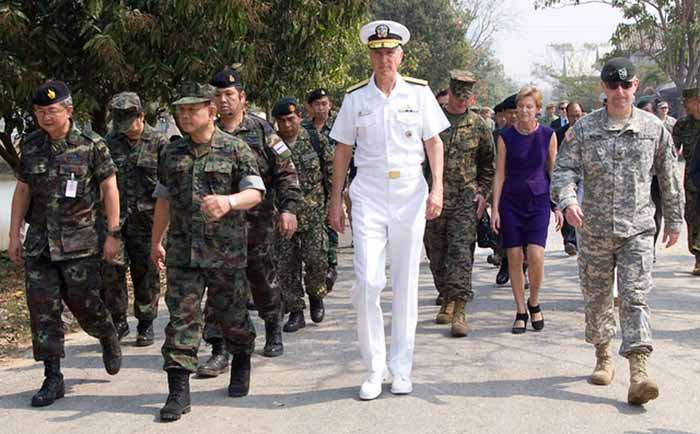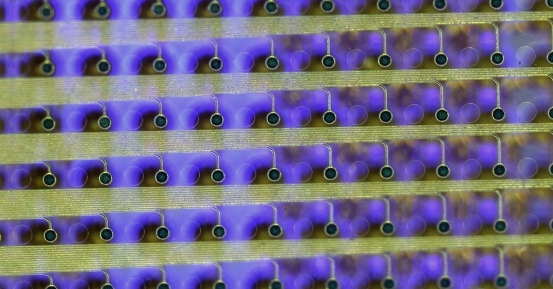
Top Military Officer in Asia-Pacific Admiral Samuel Locklear Briefed by UC San Diego Faculty
Published Date
By:
- Christine Clark
Share This:
Article Content

Admiral Samuel Locklear touring the Multinational Force Headquarters in Thailand
Admiral Samuel Locklear, Commander of U.S. Pacific Command, recently visited the UC San Diego campus where he held discussions with faculty on topics ranging from international relations to global warming.
Locklear is America’s top military officer in the Asia-Pacific in charge of monitoring the activities of an unpredictable regime in North Korea, tensions between China and Japan, as well as the impacts of climate change in the Asia-Pacific region.
Locklear was briefed by faculty of UC San Diego’s School of International Relations and Pacific Studies (IR/PS), which included Susan Shirk, Ho Miu Lam professor of China and Pacific Relations; Tai Ming Cheung, director of the University of California Institute on Global Conflict and Cooperation (IGCC); Stephan Haggard, Lawrence and Sallye Krause professor of Korea-Pacific Studies; and Victor Shih, associate professor of economics. IR/PS and IGCC has one of the strongest concentrations of academic experts in the U.S. and internationally researching issues at the intersection of security, politics, economics and innovation in the Asia-Pacific region.
The Aug. 20 event was part of U.S. Pacific Command’s ongoing efforts to develop public and private partnerships that deepen and grow understanding of how to strengthen relationships in many areas of the Asia-Pacific.
Shirk, one of the world’s leading China experts, spoke about how IR/PS is known as one of the top schools in the nation for international relations, and how faculty and research at the school and at IGCC are helping shape foreign policy and promote peace and security throughout the globe.
“This is the only professional international affairs school in the country with a focus on Asia,” Shirk said. “We train students for policy roles as well as the private sector.”
Shirk and Cheung then briefed Locklear on the role of IGCC, a multi-campus research unit located on the campus of UC San Diego.
“IGCC was founded in 1982, mostly to prevent nuclear war,” Shirk said, who is also director emeritus of IGCC. “Over the years, the mission has broadened, so it’s not just about weapons of mass destruction, but all kinds of aspects of international security.”
They briefed Locklear on IGCC’s Northeast Asia Cooperation Dialogue (NEACD) and the significant role it has had on relations between countries in the region. Launched by Shirk in 1993, NEACD provides an informal “track-two” forum among defense and foreign ministry officials and academics from the United States, China, Japan, Russia, Republic of Korea and Democratic People’s Republic of Korea. NEACD gives representatives from these countries the opportunity to exchange views on the current state of the regional security and how to promote strategic trust and engagement with the goal to reduce the risk of conflict in Northeast Asia.
The next NEACD forum will take place in mid-September. “We’ll be looking at how to improve military-to-military relations, especially between the U.S., China and Japan,” Cheung said. “We also have an annual evaluation that looks at the rates of defense transparency among the six countries. Because ‘transparency’ is such a politicized term, we try to do this as rigorously as possible.”
Cheung also provided a detailed briefing on the research conducted by IGCC on China’s intensive development of science, technology and innovation, especially in the national security arena. This research is funded by a Defense Department Minerva Initiative grant and has made IGCC one of the leading international centers examining China’s technological transformation.
Additional discussions centered on Xi Jinping, the general secretary of the Communist Party of China, the president of the People's Republic of China, and the chairman of the Central Military Commission. The group discussed Xi’s anti-corruption campaign, which aims to positively transform China’s economic and social life by capturing corrupt officials at all ranks, but raised doubts about the motives behind the initiative.
“Informally, he’s consolidated power much more than his predecessors,” said Shih. “A lot of people say that for now, he’s too powerful. What if he makes big mistakes, like economic policies failing or a financial crisis occurring? I believe it’s very possible.”
The group also discussed North Korea’s leader, Kim Jong-un, and the nuclear capabilities the country has as well as its fragile relationships both with China and the U.S.
“I take, pretty much at face value, the fact that China doesn’t see a nuclear North Korea being in their strategic interest,” said Haggard, who is a leading authority on the Korean peninsula’s economy as well as domestic and foreign policy in the region. “China accounts for about 70 percent of North Korea’s total trade. The question is what they’re going to do with that leverage. I don’t think the Chinese are willing to press hard enough to get the North Koreans into a serious negotiation.”
Haggard added, “I don’t think the U.S. has any rush to try to negotiate with North Korea either––it’s not a priority. There’s a lot of stuff going on in the world, and engaging in a negotiation with North Korea that won’t yield very much isn’t something the administration is particularly invested in doing.”
Following the briefings with IR/PS faculty, Locklear met with Scripps Institution of Oceanography faculty, which included Veerabhadran Ramanathan, a distinguished professor of climate and atmospheric sciences. The discussion centered on climate change, an issue of great importance to Locklear due to the impact rising sea levels could have on the Asia-Pacific's coastal centered populations and its long-term security threat in the region.
Ramanathan spoke about China’s outreach to the U.S. on its air pollution reduction efforts and how the Scripps’ India-California Air Pollution Mitigation Program (ICAMP) initiative to reduce air pollution in India has encouraged United Nations environmental officials to look to UC San Diego for leadership on this issue.
“Five years ago, we led a study on California’s cleanup of soot pollution,” Ramanathan said. “We were shocked to find that in just 20 years, we have cut it down by 90 percent. The UN came to us and said, ‘We want to do something like this with China.’ So IR/PS, Scripps, and the rest of UC San Diego had a series of workshops. We ended up trying to develop a program for China.”
Ramanathan, Shirk and David Victor, a professor at IR/PS and climate-change expert, have collaborated on a game plan and proposal for what specific actions China should take to reduce its air pollution. Like California, China will focus on transportation that decreases CO2 emissions because they are an increasingly important part of rural and urban regions, such as Beijing.
“We’ve had this India experience, which had support from state government, and the enthusiastic interest of the UN Environmental Programme to embark on this change,” Shirk said. “This is conceivably also an area in which military-to-military discussions could extend to many climate and air pollution issues.”
Locklear added, “We’ve had some discussion on alternative fuels and green fuels. So they [China] are highly interested in those areas. We have got to work together to find a solution to this pressing problem.”
According to Locklear, under his leadership, the U.S. Pacific Command will continue to develop partnerships through engagements like this briefing at UC San Diego as a means to strengthen exchange and security in many areas of the Asia-Pacific.
Share This:
You May Also Like
Stay in the Know
Keep up with all the latest from UC San Diego. Subscribe to the newsletter today.


